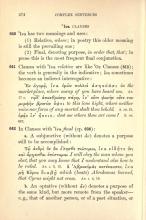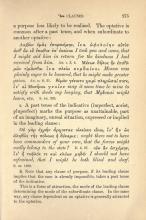640. Ἵνα has two meanings and uses
1. Relative, where; in poetry this older meaning is still the prevailing one.
2. Final, denoting purpose, in order that, that; in prose this is the most frequent final conjunction.
641. Clauses in which Ἵνα is relative are like Ὅς Clauses (§ 615); the verb is generally in the indicative; ἵνα sometimes becomes an indirect interrogative.
Ἐν ἀγορᾷ, ἵνα ῡ̔μῶν πολλοὶ ἀκηκόᾱσι
in the market-place, where many of you have heard me
Plato Apology 17c
τῷδʼ ἀπανθρώπῳ πάγῳ, ἵνʼ οὔτε φωνὴν οὔτε του μορφὴν βροτῶν ὄψει
to this lone height, where neither voice nor form of any mortal shalt thou behold.
Aesch. Prometheus Bound 19–21
ὁρᾷς ἵνʼ ἥκεις;
Dost see awhere thou art come?
Soph. Oedipus the King 687
642. In Clauses in which Ἵνα denotes purpose (cp. § 636):
a. A subjunctive (without ἄν) denotes a purpose still to be accomplished.
Tῷ ἀνδρὶ ὃν ἂν ἕλησθε πείσομαι, ἵνα εἰδῆτε ὅτι καὶ ἅρχεσθαι ἐπίσταμαι.
I will obey the man whom you elect, that you may know that I understand also how to be ruled.
Xen. Anabasis 1.3.15
ἅ Ἀβροκόμᾱς κατέκαυσεν, ἵνα μὴ Κῦρος διαβῇ
which (boats) Abrokomas burned, that Cyrus might not cross
Xen. Anabasis 1.4.18
b. An optative (without ἄν) denotes a purpose of the same kind, but more remote from the speaker—e. g., that of another person, or of a past situation, or a purpose less likely to be realized. The optative is common after a past tense, and when subordinate to another optative.
Λαβὼν ῡ̔μᾶς ἐπορευόμην, ἵνα ὠφελοίην αὐτὸν ἀνθʼ ὧν εὖ ἔπαθον ὑπ' ἐκείνου.
I took you and came, that I might aid him in return for the kindness I had received from him.
Xen. Anabasis 1.3.4
Mένων δῆλος ἦν ἐπιθῡμῶν τῑμᾶσθαι ἵνα πλείω κερδαίνοι.
Menon was plainly eager to be honored, that he might make greater gains.
Xen. Anabasis 2.6.21
θῡμὸν γένοιτο χειρὶ πληρῶσαί ποτε, ἵνʼ αἱ Μυκῆναι γνοῖεν κτλ.
May it some time be mine to satisfy with deeds my longing, that Mykenai might learn, etc.
Soph. Philoctetes 324–325
c. A past tense of the indicative (imperfect, aorist, pluperfect) marks the purpose as unattainable, part of an imaginary, unreal situation, expressed or implied in the leading clause.
Oὐ γὰρ ἐχρῆν ἄρχοντας οἰκείους εἶναι, ἵνʼ ἦν ὡς ἀληθῶς τῆς πόλεως ἡ δύναμις;
Ought there not to have been commanders of your own, that the forces might really belong to the state?
Demosthenes 4.27
οὐκ ἂν ἐσχόμην, ἵνʼ ἦ τυφλός τε καὶ κλύων μηδέν.
I should not have refrained, that I might be both blind and deaf.
Soph. Oedipus the King 1387–1389
d. Note that any clause of purpose, if its leading clause implies that the case is already impossible, takes a past tense of the indicative. This is a form of attraction, the mode of the leading clause determining the mode of the subordinate clause. In the same way, any clause dependent on an optative is generally attracted to the optative.


